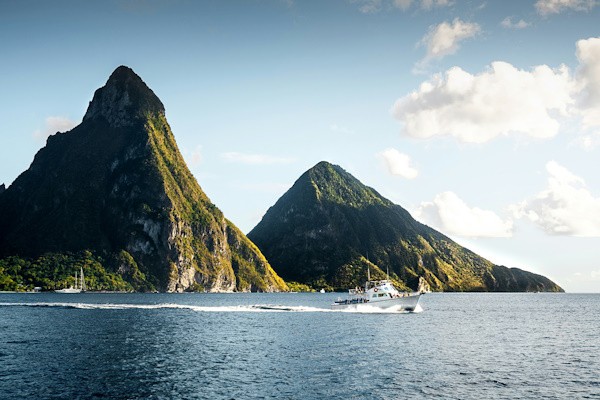Contact Information:
Published Content
Moving to the Caribbean: Easy Ways to Call the Islands Home

The Caribbean offers an irresistible mix of natural beauty and relaxed living, making it a dream destination for high-net-worth individuals looking to relocate. In this interview with Zlata Erlach, Head of the Austrian office, Caribbean Investment Programs Expert at Immigrant Invest, provides a comprehensive guide on how to move to the Caribbean, covering everything from lifestyle benefits to the various pathways to obtaining citizenship, including Caribbean CBI programs.
Caribbean Living Overview
Climate and natural beauty. The Caribbean is famed for its tropical climate, offering warm temperatures year-round. The region has stunning beaches, lush rainforests, and a relaxed pace of life. This natural beauty is a significant draw for those looking to escape colder climates and enjoy a more leisurely lifestyle.
Cuisine and culture. The Caribbean's cuisine is a mix of African, European, and Indigenous influences. From fresh seafood to tropical fruits, the food is as diverse as it is delicious. Picture yourself dining on grilled lobster, sipping on freshly squeezed mango juice, or enjoying a traditional dish like jerk chicken.
Cultural festivals, music, and dance are integral parts of life, providing an enriching experience for residents. The lively rhythms of calypso, reggae, and soca music, coupled with colourful parades and celebrations, create an atmosphere of joy and community that is unique to the Caribbean.
Education and healthcare. The Caribbean offers a range of educational institutions, including international schools and universities, ensuring quality education for expatriate families. These schools often follow the British or American curriculum, providing a familiar and high-standard education for children.
Healthcare standards vary across the islands, but many countries have modern facilities and access to international medical care. For instance, islands like St Kitts and Nevis have well-equipped hospitals and clinics that cater to both locals and expatriates, ensuring that you and your family receive excellent medical care.
Taxes and financial benefits. Many Caribbean countries offer favourable tax regimes for expatriates, including no capital gains tax and low-income tax rates. These benefits make the region attractive for those looking to optimise their financial situation while enjoying a high quality of life.
For instance, Grenada, a renowned financial hub, offers a zero-tax regime on foreign income. This financial advantage, coupled with the idyllic living conditions, makes the Caribbean a prime destination for affluent individuals seeking both luxury and fiscal efficiency.
Safety and community. Safety can vary from island to island, but generally, the Caribbean is considered a safe place to live. Close-knit communities and a slower pace of life contribute to a sense of security and well-being among residents.
Antigua and Barbuda neighbourhood watch programs and community policing initiatives that enhance safety and foster a strong sense of community. Whether you choose to live in a gated community, a beachfront villa, or a historic town, you can find a safe and welcoming environment in the Caribbean.
How to Move to the Caribbean Through Investment — top 5 countries
Fastest Caribbean citizenship investment programs operate in five countries and appeal to high-net-worth individuals looking for a straightforward and relatively quick process. Investment programs not only grant citizenship but also provide opportunities to invest in real estate, tourism, and other lucrative sectors, ensuring a return on investment.
1. Antigua and Barbuda. Citizenship by investment in Antigua and Barbuda can be obtained through a real estate investment of at least $325,000 or a donation to the National Development Fund starting at $230,000.
The process takes six months, offering visa-free travel to over 140 countries. The real estate market in Antigua and Barbuda is booming, with luxurious beachfront properties and exclusive resorts offering excellent investment opportunities.
2. Grenada. Grenada's Citizenship by Investment program requires an investment of $235,000 to the National Transformation Fund or a real estate investment of $270,000. Citizenship can be acquired in approximately eight months, providing access to the USA E-2 Investor Visa.
Grenada economy and location in the southern Caribbean make it an attractive destination for investors. The island is known for its picturesque landscapes, spice plantations, and thriving tourism industry.
3. St Kitts and Nevis. The oldest citizenship by investment program, St Kitts and Nevis offers citizenship through a $250,000 donation to the Federal Consolidated Fund or a $400,000 real estate investment.
The processing time is usually six months, granting visa-free access to over 150 countries. St Kitts and Nevis, with its dual-island charm, offers a mix of historical richness and modern luxury. The real estate market includes upscale resorts, private villas, and prime commercial properties.
4. St Lucia. To obtain citizenship in St Lucia, an investment of $240,000 to the National Economic Fund or a real estate investment of $300,000 is required. The other three options involve investment in infrastructure projects, business investment and bond purchases.
The application process takes about six months, offering global mobility and financial flexibility. St Lucia's landscapes, from the iconic Pitons to lush rainforests, make it a paradise for nature lovers and investors alike. The island's investment opportunities extend to eco-tourism, hospitality, and residential developments.
5. Dominica. Dominica offers citizenship through a $200,000 donation to the Economic Diversification Fund or a $200,000 real estate investment. The processing time is six months, with benefits including visa-free travel to over 140 countries.
Dominica, known as the “Nature Island” of the Caribbean, has unspoiled natural beauty and a commitment to sustainable development. Investing in Dominica not only secures citizenship but also supports the island's environmental conservation efforts.
Other Ways of Moving to the Caribbean
Naturalisation For those who prefer a more traditional route, naturalisation is an option. This usually requires residing in the country for seven years, demonstrating good character, and proving financial stability. For example, in Dominica, you can apply for citizenship after seven years of continuous residence. This process allows you to integrate into the local community, build lasting relationships, and contribute to the island's development.
Birth. Citizenship by birth is available in some Caribbean countries. Children born in these countries often automatically receive citizenship, offering a pathway for parents to secure their family's future in the Caribbean. For instance, in St Kitts and Nevis, children born to expatriate parents can acquire citizenship, providing them with the right to live, work, and study in the Caribbean.
Marriage. Marrying a citizen of a Caribbean country can provide a route to residency and eventually citizenship. The requirements and timelines vary by country, but this method often includes demonstrating the legitimacy of the marriage and a period of residency.
In St Lucia, for example, you can apply for permanent residency after being married to a citizen for five years. This pathway allows you to become part of the local community and enjoy the benefits of Caribbean life.
Conclusion
Moving to the Caribbean is an enticing prospect for high-net-worth individuals seeking relaxation and favourable living conditions. Whether through investment, naturalisation, birth, or marriage, the islands offer various pathways to make this dream a reality. Each method has its own benefits and requirements, allowing you to choose the option that best suits your circumstances and goals.
Published Content
See all listings from Published Content
Newsletter
To sign up up for www.glos.info weekly newsletter, please click here.
Please mention www.glos.info when contacting this advertiser.









